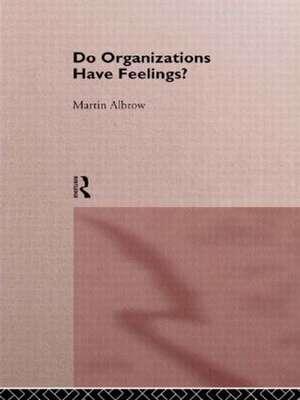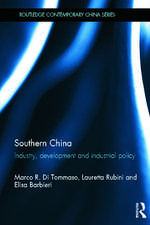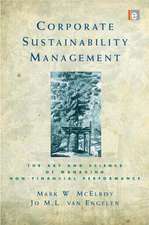Do Organizations Have Feelings?
Autor Martin Albrowen Limba Engleză Paperback – 28 aug 1997
| Toate formatele și edițiile | Preț | Express |
|---|---|---|
| Paperback (1) | 443.09 lei 6-8 săpt. | |
| Taylor & Francis – 28 aug 1997 | 443.09 lei 6-8 săpt. | |
| Hardback (1) | 998.88 lei 6-8 săpt. | |
| Taylor & Francis – 28 aug 1997 | 998.88 lei 6-8 săpt. |
Preț: 443.09 lei
Nou
Puncte Express: 665
Preț estimativ în valută:
84.78€ • 88.53$ • 70.01£
84.78€ • 88.53$ • 70.01£
Carte tipărită la comandă
Livrare economică 16-30 aprilie
Preluare comenzi: 021 569.72.76
Specificații
ISBN-13: 9780415115476
ISBN-10: 0415115477
Pagini: 200
Dimensiuni: 156 x 234 x 17 mm
Greutate: 0.3 kg
Ediția:New.
Editura: Taylor & Francis
Colecția Routledge
Locul publicării:Oxford, United Kingdom
ISBN-10: 0415115477
Pagini: 200
Dimensiuni: 156 x 234 x 17 mm
Greutate: 0.3 kg
Ediția:New.
Editura: Taylor & Francis
Colecția Routledge
Locul publicării:Oxford, United Kingdom
Cuprins
INTRODUCTION: THE NECESSITY FOR THE SOCIOLOGY OF ORGANIZING Big ideas; small sciences. Passing fashions, enduring problems, For a pragmatic universalism, Persisting sociology Part I Objectivity and reflexivity 1 THE STUDY OF ORGANIZATIONS—OBJECTIVITY OR BIAS? 2 THE DIALECTIC OF SCIENCE AND VALUES IN THE STUDY OF ORGANIZATIONS 2.1 Utility: organizational science as technology 2.2 Relativity and reality: fundamental assumptions in the study of organizations 2.3 Reflexivity: organizations as theoretical constructs 2.4 Conclusion Part II Reassessing Weber for current uses 3 THE APPLICATION OF THE WEBERIAN CONCEPT OF RATIONALIZATION TO CONTEMPORARY CONDITIONS 3.1 Developing the rationalization thesis 3.2 Two contemporary cases of rationalization 3.3 The bounds of rationality 4 REDEFINING AUTHORITY FOR POST-WEBERIAN CONDITIONS 4.1 The pivotal place of legal-rational authority in modernity 4.2 On not amending Weber’s concept of authority 4.3 Changing concepts for a changed world 4.4 A concept of authority for postmodern organizing Part III Feeling for new organization 5 SINE IRA ET STUDIO—OR DO ORGANIZATIONS HAVE FEELINGS? 5.1 Introduction 5.2 Organization before bureaucracy 5.3 The Weber puzzle 5.4 Passionate bureaucrats and loving entrepreneurs 5.5 A theoretical site for feelings 5.6 Conclusion 6 REVISING ACCOUNTS OF ORGANIZATIONAL FEELING 6.1 Researching emotionality in organizations 6.2 Organizational goals 6.3 Task performance 6.4 Communication and situational logics 6.5 Emotions and organizational structure Part IV Organizing returns from the social 7 SOCIOLOGY FOR POSTMODERN ORGANIZERS—WORKING THE NET with Neil Washbourne 7.1 Sociology and the social reality of organization 7 2 Three old modern benchmarks for the social 7.3 Environmentalism as postmodern organization 7.4 Organizing work 7.5 Social change narrative 7.6 The Net and recoveries of the social 8 SOCIOLOGY FOR ORGANIZATION IN THE GLOBAL AGE 8.1 The non-modernity of the sociology of organization 8.2 Deconstructing the theory of the modern organization 8.3 Postmodern organizing or the sociology of postmodernity 8.4 The postmodern condition of organization 8.5 Epochal change and organizational narratives
Notă biografică
Martin Albrow has been Eric Voegelin Guest Professor in the University of Munich and is currently Research Professor of Social Sciences at Roehampton Institute London. His other publications include Bureaucracy (1970), Max Weber’s Construction of Social Theory (1990) and The Global Age (1996).
Descriere
This book argues that adequate explanation of the way that organizations function for those engaged in business and those who study it must transcend the traditional divide between reason and emotion.















